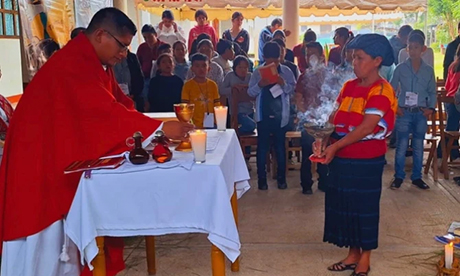The Vatican has approved integrating Indigenous traditions into the Catholic Mass in Mexico’s Diocese of San Cristóbal de Las Casas.
The adaptations include new roles for lay leaders and cultural expressions during worship, reflecting the traditions of local Indigenous communities.
According to a decree issued by Cardinal Arthur Roche, the Dicastery for Divine Worship granted formal recognition for these changes on 8 November.
However, the Vatican is reviewing broader use for all Mexican Indigenous groups and considering variations for different communities.
Cardinal Felipe Arizmendi Esquivel praised the Vatican’s approval: “It is the official recognition of the Church that these adaptations are recognised as valid and legitimate.
“They are the liturgy of the Church, not just customs and traditions that are viewed with suspicion”.
Approved Adaptations
The approved adaptations emphasise Indigenous traditions while maintaining the theological integrity of the Roman rite. Community-selected leaders, known as “Principals”, will guide communal prayers during Mass, fostering greater participation.
Additionally, post-Communion thanksgiving may now include rhythmic movements, enabling worshippers to express their faith in culturally meaningful ways.
The cardinal explained that ritual dances were approved for the offertory, the prayers of the faithful and the thanksgiving after Communion.
He pointed out that these “are not folklore but simple movements of the entire assembly – monotone, contemplative, accompanied by traditional music – which express the same thing as the Roman rite but in a different cultural form”.
Another approved point is that women can now serve as thurifers during Mass. After the priest blesses the incense, they can incense the altar, images, Gospel book, ministers and assembly.
Using culturally specific incense, this practice reflects Indigenous customs where women traditionally perform this role, not as a feminist demand but as part of their spiritual heritage.
Making a culture
With over 23 million Indigenous people in Mexico representing 62 languages, the adaptations aim to make the liturgy more inclusive. Cardinal Arizmendi stated, “The content of the mass is not being changed, but the way it is expressed. This is not about destroying the liturgy but making it a culture”.
The Vatican’s recognition follows decades of advocacy for inculturation as supported by the Second Vatican Council and reiterated by Pope Francis in Querida Amazonia.
It also aligns with global efforts such as Australia’s approval of an Aboriginal liturgy earlier this year.
Sources
Additional reading
News category: World.




